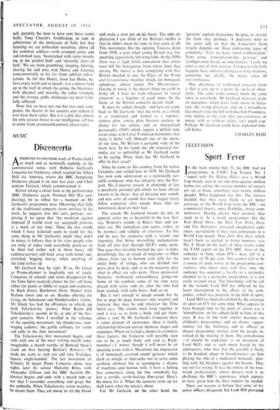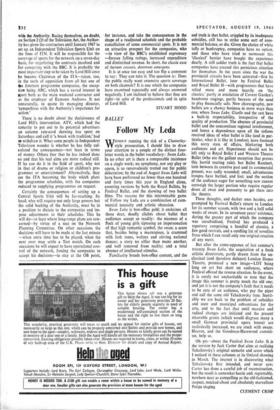Sport Fever
TELEVISION Ithe week ending July 31, the BBC had ten 'programmes in TAM's Top Twenty. No. I —equal with No Hiding Place—was a World Cup match, seen in six and three-quarter million homes (or, taking the average number of viewers per set as three, something over twenty million people). What happened was this. The viewers decided that they were likely to get better coverage of the World Cup from the BBC—no commercial breaks, more flexibility, better com- mentators. Having chosen their channel, they stuck to it. As a result, programmes like the Ked Dodd Show, the Dick Van Dyke Show and The Defenders attracted exceptional audi- ences—particularly if they were contiguous to a World Cup match. Thus Juke Box buy. which hasn't been so exalted in living memory, was No. 8. Hard on the heels of these results came the TAM report on the ITV/BBC share of the audience in June, when ITV's share fell to a new low of 56 per cent. This cannot fail to be a source of acute worry to the programme con- tractors, who know very well that, once the audience has acquired a loyalty to a particular channel or to a particular programme, it is not easily weaned away. The knowledge will be salt in the wounds Lord Hill has inflicted by his latest intervention in the affairs of the com- panies—which was precisely in the field of sport. Lord Hill has been dissatisfied by the coverage of sport on ITV for some time. What appears to have brought him to the pitch of action was a 'consultation' on the subject held in June of this year. It was in line with similar meetings on children's programmes and on drama—oppor- tunities for the Authority and its officers to discuss programme matters with the people in- volved in the making of them. The consultation —it should be explained—is an invention of Lord Hill's and as such much feared by the contractors, who (not that the parallel is likely to be bandied about in board-rooms) see him playing the role of a mediaeval monarch: plot- ting with the burghers against the barons. They are not far wrong. It was the outcry of the frus- trated professionals, whose dearest wish is to challenge the BBC's supremacy, which appears to have given him the final impetus he needed. There are reasons to believe that some of his senior officers disagreed, but Lord Hill prevailed with the Authority. Basing themselves, no doubt, on Section 2 (2) of the Television Act, the Author- ity has given the contractors until January 1967 to set up an Independent Television Sports Unit on the lines of ITN. It will be responsible for the coverage of sports for the network on a seven-day basis, for negotiating the contracts involved and for competing with the BBC. It is probably the most important step to be taken by Lord Hill since he became Chairman of the ITA—taken, too, in the teeth of opposition from all but one of the fourteen programme companies, the excep- tion being ABC, which has a vested interest in sport both as the main weekend contractor and as the employer of Eamonn Andrews. It not unnaturally, to quote its managing director, `sympathises with the Authority's impatience for action.'
There is no doubt about the decisiveness of Lord Hill's intervention. ATV, which had the temerity to put out to its potential advertisers an autumn rate-card showing less sport on Saturdays and call it 'a break with tradition,' had to withdraw it. What some people in Independent Television wonder is whether he has fully cal- culated the consequences—not least in terms of money. Others fear that he has indeed done so and that his real aims are more radical still. If he can do it in the field of sport, why not in that of drama or religion or children's pro- grammes or entertainment? Alternatively, they see the ITA becoming the body which plans the programme schedules, with the companies reduced to supplying programmes on request.
Certainly the consequences of setting up a Central Sports Unit will be far-reaching. Its head, who will require not only large powers but the solid backing of the Authority, must be in a position to dictate to the companies and im- pose adjustments to their schedules. This he will do—at least where long-range plans are con- cerned—by virtue of a seat on the Network Planning Committee. On other occasions the decisions will have to be made at the last minute —when extra time has to be played, when the next over may settle a Test match. On such occasions he will expect to have operational con- trol of the network, forcing the companies to accept his decisions—to stay at the OB point, for instance, and take the consequences in the shape of a readjusted schedule and the probable cancellation of some commercial spots. It is not an attractive prospect for the companies, who —in view of the BBC's established supremacy —foresee falling ratings, increased expenditure and diminished revenue. In short, the classic case of lucrum cessans, damnum emergens.
It is at once too easy and too flip a comment to say : They can take it. The question is : Does the public really want extensive sports coverage on both channels? It is one which the companies have examined repeatedly and always answered negatively. I am inclined to believe that they are right—in spite of the professionals and in spite of Lord Hill.
STUART HOOD































 Previous page
Previous page